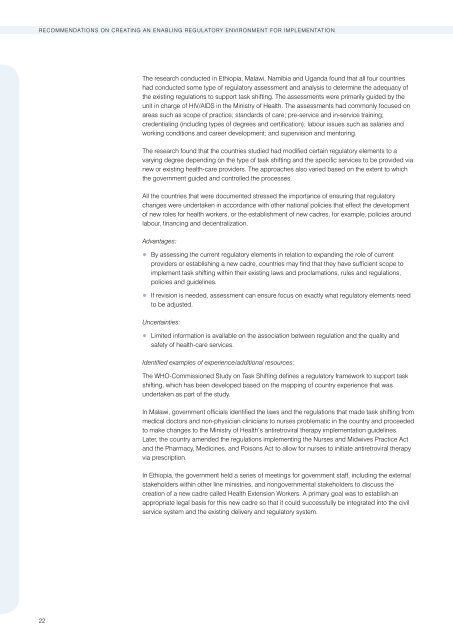Task Shifting - Global Recommendations and Guidelines - unaids
Task Shifting - Global Recommendations and Guidelines - unaids
Task Shifting - Global Recommendations and Guidelines - unaids
You also want an ePaper? Increase the reach of your titles
YUMPU automatically turns print PDFs into web optimized ePapers that Google loves.
<strong>Recommendations</strong> on creating an enabling regulatory environment for implementation<br />
The research conducted in Ethiopia, Malawi, Namibia <strong>and</strong> Ug<strong>and</strong>a found that all four countries<br />
had conducted some type of regulatory assessment <strong>and</strong> analysis to determine the adequacy of<br />
the existing regulations to support task shifting. The assessments were primarily guided by the<br />
unit in charge of HIV/AIDS in the Ministry of Health. The assessments had commonly focused on<br />
areas such as scope of practice; st<strong>and</strong>ards of care; pre-service <strong>and</strong> in-service training;<br />
credentialing (including types of degrees <strong>and</strong> certification); labour issues such as salaries <strong>and</strong><br />
working conditions <strong>and</strong> career development; <strong>and</strong> supervision <strong>and</strong> mentoring.<br />
The research found that the countries studied had modified certain regulatory elements to a<br />
varying degree depending on the type of task shifting <strong>and</strong> the specific services to be provided via<br />
new or existing health-care providers. The approaches also varied based on the extent to which<br />
the government guided <strong>and</strong> controlled the processes.<br />
All the countries that were documented stressed the importance of ensuring that regulatory<br />
changes were undertaken in accordance with other national policies that effect the development<br />
of new roles for health workers, or the establishment of new cadres, for example, policies around<br />
labour, financing <strong>and</strong> decentralization.<br />
Advantages:<br />
• By assessing the current regulatory elements in relation to exp<strong>and</strong>ing the role of current<br />
providers or establishing a new cadre, countries may find that they have sufficient scope to<br />
implement task shifting within their existing laws <strong>and</strong> proclamations, rules <strong>and</strong> regulations,<br />
policies <strong>and</strong> guidelines.<br />
• If revision is needed, assessment can ensure focus on exactly what regulatory elements need<br />
to be adjusted.<br />
Uncertainties:<br />
• Limited information is available on the association between regulation <strong>and</strong> the quality <strong>and</strong><br />
safety of health-care services.<br />
Identified examples of experience/additional resources:<br />
The WHO-Commissioned Study on <strong>Task</strong> <strong>Shifting</strong> defines a regulatory framework to support task<br />
shifting, which has been developed based on the mapping of country experience that was<br />
undertaken as part of the study.<br />
In Malawi, government officials identified the laws <strong>and</strong> the regulations that made task shifting from<br />
medical doctors <strong>and</strong> non-physician clinicians to nurses problematic in the country <strong>and</strong> proceeded<br />
to make changes to the Ministry of Health’s antiretroviral therapy implementation guidelines.<br />
Later, the country amended the regulations implementing the Nurses <strong>and</strong> Midwives Practice Act<br />
<strong>and</strong> the Pharmacy, Medicines, <strong>and</strong> Poisons Act to allow for nurses to initiate antiretroviral therapy<br />
via prescription.<br />
In Ethiopia, the government held a series of meetings for government staff, including the external<br />
stakeholders within other line ministries, <strong>and</strong> nongovernmental stakeholders to discuss the<br />
creation of a new cadre called Health Extension Workers. A primary goal was to establish an<br />
appropriate legal basis for this new cadre so that it could successfully be integrated into the civil<br />
service system <strong>and</strong> the existing delivery <strong>and</strong> regulatory system.<br />
22

















